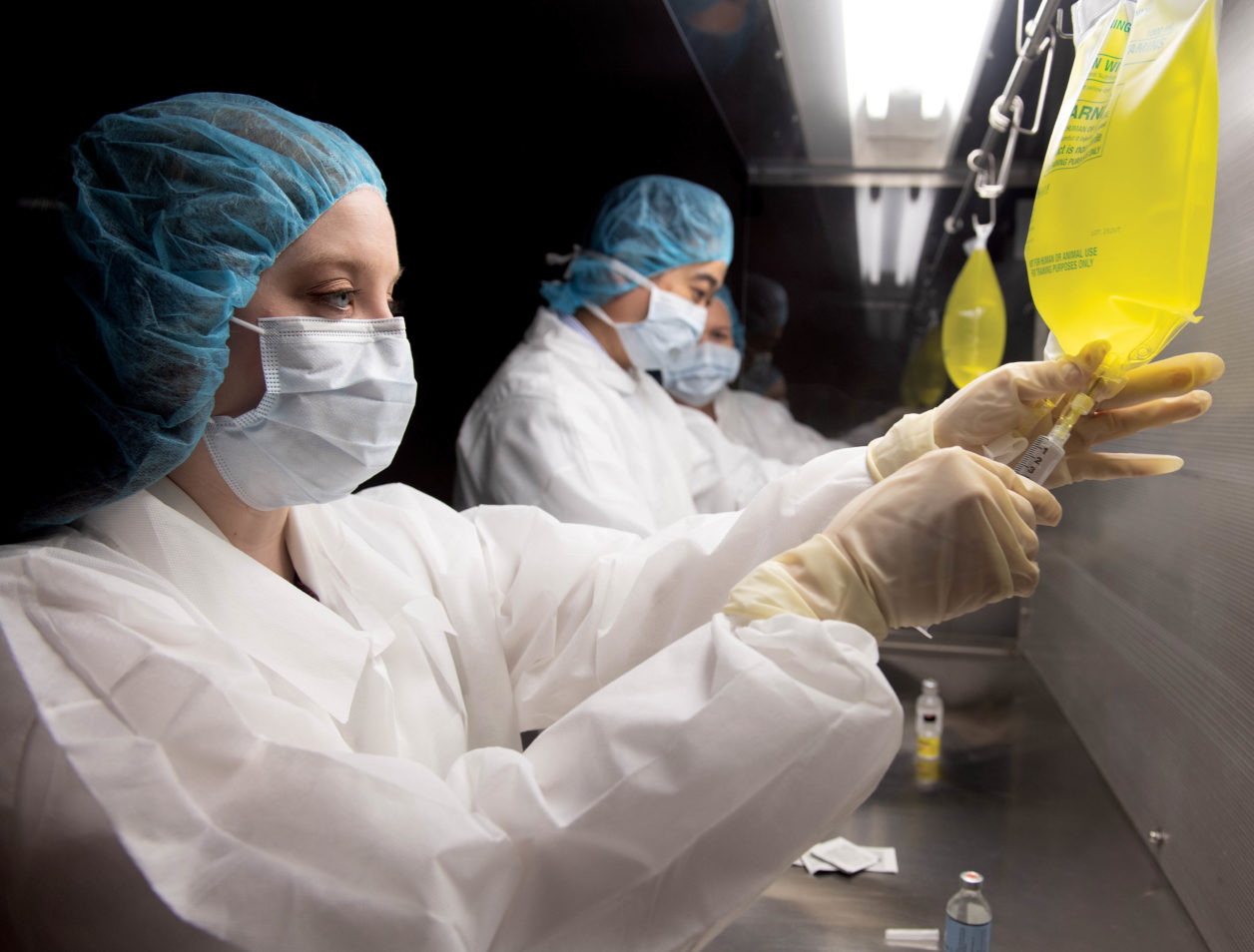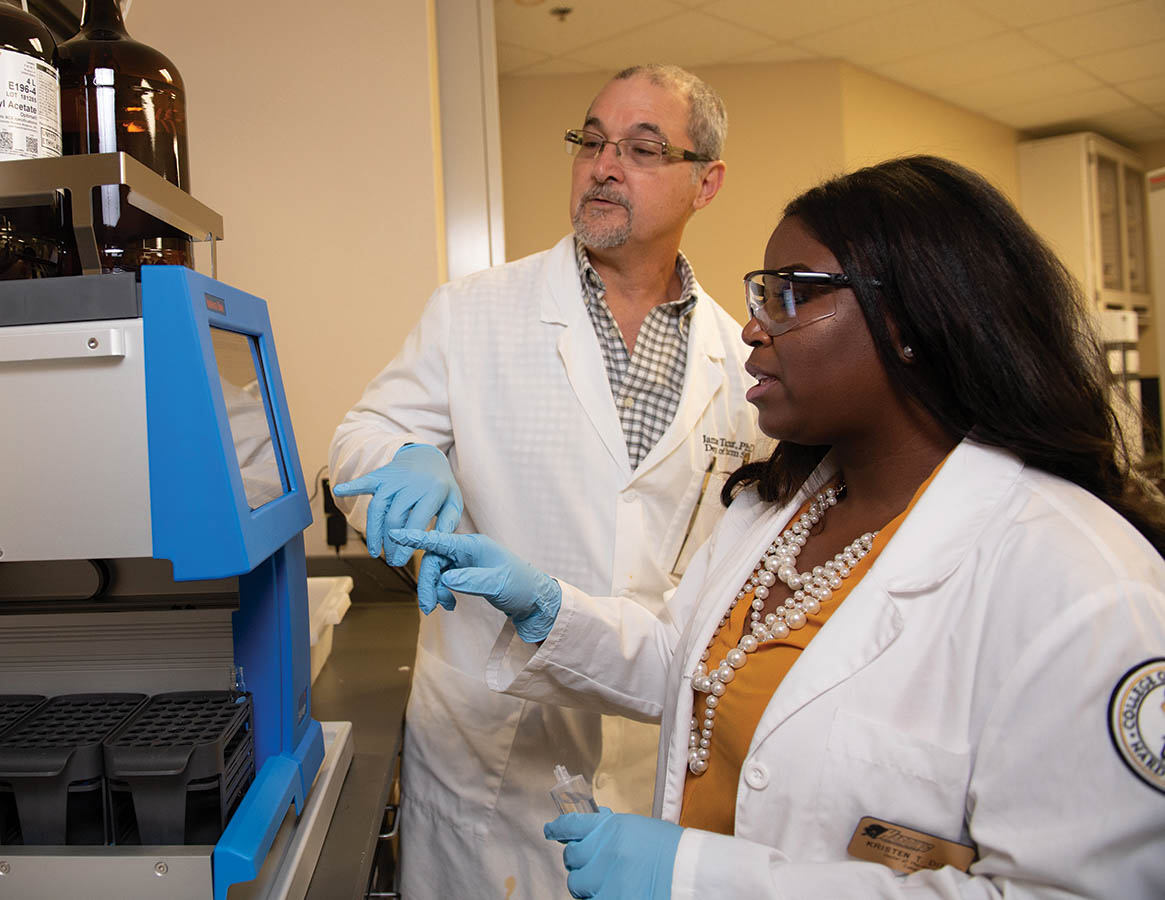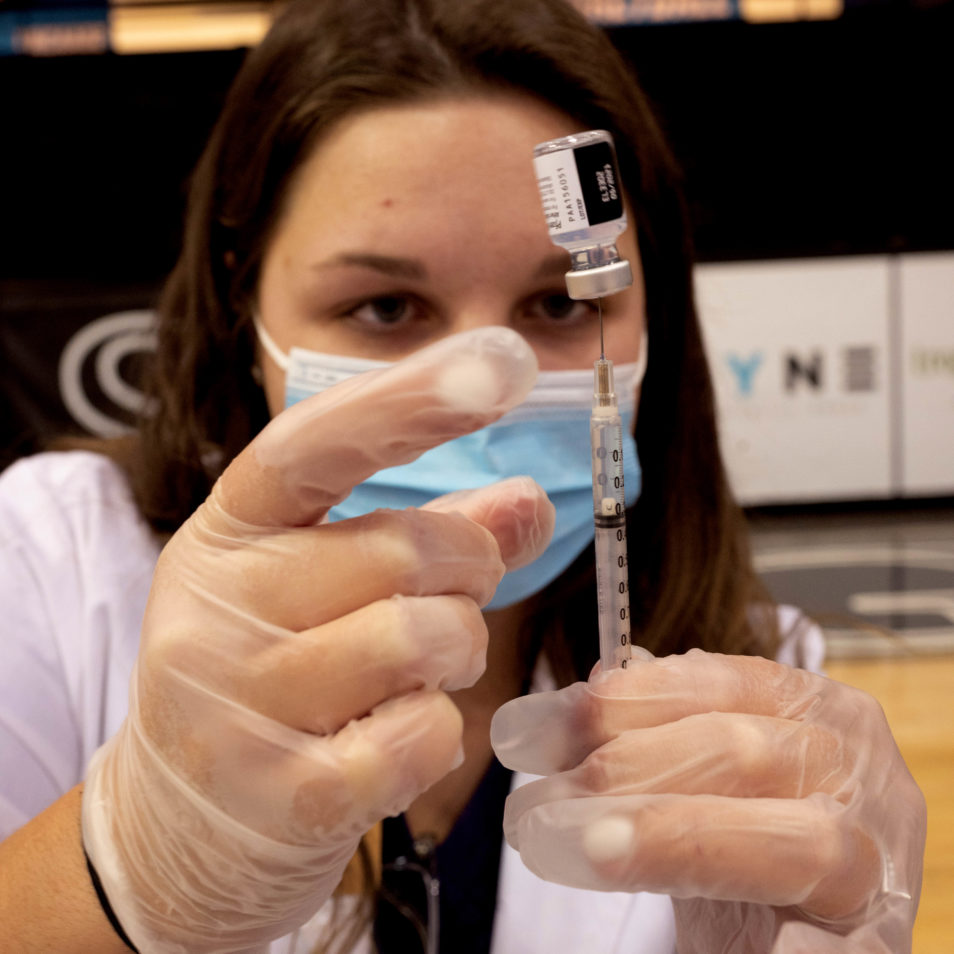By Jeff Mercer, dean of the College of Pharmacy | Photography by Jeff Montgomery |

This May, the College of Pharmacy will graduate its 10th class of Doctor of Pharmacy students. They will join hundreds of other Harding-trained pharmacists who are caring for patients at practice sites throughout the nation at a time when frontline health providers are needed the most. Dr. Wali Abdul, a 2020 graduate and now community pharmacist at Kroger in Mesquite, Texas, says, “Being a pharmacist is more important than ever before. Harding prepared me to take on the added responsibility of immunizing patients in my home community during the pandemic.”
Pharmacy practice has changed significantly over time, and that is evident in the diverse careers that graduates have chosen following their education at Harding. A number of alumni are now community pharmacy owners. Some have moved into corporate management and regulatory affairs with companies like Walgreens and Walmart. Others are fulfilling operational roles as directors and managers of pharmacy and related services at hospitals and health systems throughout the United States. Still more have entered direct patient clinical-care roles at institutions throughout Arkansas and nationally at well-known sites like Johns Hopkins, Le Bonheur Children’s Hospital, MD Anderson and Veteran’s Administration Systems.
While Harding’s College of Pharmacy is well established and has produced excellent pharmacists through the years, the drive to innovate and adapt to new opportunities in pharmacy education remains a goal for the program. That was the purpose of a recent announcement outlining a new 3 ½ year pharmacy curriculum that offers incoming students the opportunity to save time and money by starting their pharmacy education sooner and finishing earlier. This unique program is designed around the student and offers hybrid modes of learning with online coursework in the summer and on-ground classes during the traditional fall and spring semesters. Students also continue to learn experientially in real-world settings, all with Harding’s commitment to teaching within a foundation of Christian ethics and values.
Harding’s new 3 ½ year pharmacy curriculum is the first of its kind in Arkansas and is unlike other pharmacy programs throughout the country. Where most pharmacy schools or colleges are four years in duration, Harding’s College of Pharmacy utilizes contemporary teaching and practice models to prepare students for graduation at least one semester earlier. The result will allow pharmacy graduates to finish their training and enter the workforce earlier, all at less overall cost as compared to students from traditional four-year institutions.
Dr. Steve Sparks, a 2013 graduate and now pharmacist and director of U.S. Ethics and Compliance at Walmart Corporate, points out that the move to a 3 ½ year curriculum will offer Harding graduates the unique opportunity to enter the job market during the cold and flu season when many pharmacies are hiring.
“HUCOP is creating a way for their program to be successful and competitive by offering a great educational experience that can offer a job placement in a time of need,” Sparks says.
The first students in this innovative new curriculum will enroll at Harding this summer, but they will not be physically on campus until fall. Dr. Jeanie Smith, assistant dean for admissions and student affairs, explains that “the biggest change in our curriculum is the utilization of online learning during our summer terms. These were downtimes in our four-year curriculum, so we set out to design a manageable schedule for students that would continue their education while still offering time off for breaks and flexibility in preferred locations.” Summer courses are online, customizable and flexible enough to allow students to enroll in these courses from home or elsewhere while working for pay or completing pharmacy practice experiences as part of the pharmacy curriculum. Breaks are also strategically built into the program for students to enjoy time with family and friends and to assure student health and wellness. Courses in the fall and spring semesters remain traditional and on campus so as to maintain the special connection that Harding pharmacy students gain as a cohort.

Implementing a program change of this magnitude is quite an undertaking and has involved all of the faculty and staff at the College of Pharmacy working together to make sure that a successful plan is in place for the future. Dr. Josh Brown, associate professor in the department of pharmaceutical sciences, outlined the process for approval of the new curriculum: “We began with three goals in mind – to condense the program to 3 ½ years, to utilize new and innovative teaching methods, and to integrate and align existing coursework in the classroom in order to provide a new and innovative curriculum for our students. Any one of those would have been a challenge, but our focus was on student needs. Through tough and focused work, I think we have created something special for our future cohorts of pharmacy students. I’m really excited to see it come to life.”
Another important goal for pharmacy students is to explore areas of professional interest through classroom electives and pharmacy practice experiences. The revised curriculum is designed to provide more opportunities for students to choose electives and experiences that are specific to their career goals. Students may choose from a variety of focused educational tracks that offer extra training in advanced pharmacotherapy, management, medical missions, or public health. Dual degree options are also available in collaboration with Harding’s Paul R. Carter College of Business Administration, where students can pursue an online Master of Business Administration or a Master of Science in Information Systems in conjunction with their Doctor of Pharmacy degree. With online options for these additional degrees as well as other elective and training opportunities available in the new curriculum, Harding’s pharmacy graduates will enter the workforce even more confident and prepared for contemporary pharmacy practice.
For students who may be considering a career in healthcare, pharmacy offers the opportunity for direct patient care and the chance to be on the front lines as a trusted healthcare provider. Whether working in a hospital, community pharmacy, or through a variety of other direct patient care settings, pharmacists serve as the most knowledgeable medication experts on the healthcare team.
A pharmacy career is very rewarding, both financially and professionally. With average six-figure starting salaries, Harding-trained pharmacists consistently enter the job market among the highest paid graduates from the University each year. The quality of academic training is in line with schools and colleges of pharmacy across the nation, as demonstrated through national accreditation and the academic performance of Harding students on national assessments and feedback from students and alumni.
But Harding is more than just academics. Dr. Kirsty Wasaham, a 2014 alumna and current inpatient pharmacist at Med Center Health in Bowling Green, Kentucky, says that Harding’s pharmacy program is different from others: “What really sets Harding’s program apart from other pharmacy schools is the emphasis on patient-centered care and a heart of Christian service. Providing the best outcome to your patients is only possible if they trust you and you can communicate the necessary information to them — both things I was taught well by Harding faculty and staff.”
Students interested in pursuing a Doctor of Pharmacy degree at Harding can apply to the pharmacy program as early as their freshman year of college, and an undergraduate degree is not necessary. Smith points out that “many students assume that a degree is required for admission into our program, but in reality, only 64 hours of prepharmacy coursework is required. With our new condensed program, students can even earn a practicing doctorate degree in less than six total years of study.”
Harding College of Pharmacy offers one of the more unique educational pathways for students to consider when pursuing pharmacy. For more information about the program or details on how to apply, visit harding.edu/pharmacy or contact the office of pharmacy admissions at 501- 279-5528.

By Emma Aly
Since December, the College of Pharmacy has partnered
with hospitals, pharmacies and other locations statewide to assist in the distribution of the COVID-19 vaccine.
After the approval of the first COVID-19 vaccine in December 2020, the College of Pharmacy began sending students and faculty to local hospitals across the state to help healthcare workers receive their vaccines. Dr. Rayanne Story, assistant dean for experiential education and assistant professor in the College of Pharmacy, says students did not delay in their assistance.
“Our finals ended Thursday, and we sent our first students Friday and Saturday,” Story says. “Even during the week of Christmas, we sent students out.”
The vaccine initiative has grown through strong relationships between the College of Pharmacy and many pharmacies, hospitals and clinics across the state, especially to heavily populated or very rural areas that would benefit from extra help.
Dr. Jeff Mercer, dean of the College of Pharmacy, says student help is useful because pharmacists have full-time jobs within their normal duties.
“Supply continues to build, but the challenge is scaling up the workforce in order to deliver it,” Mercer says. “That’s where our students and faculty come in and really anyone who is able to immunize because every little bit we contribute is use of the supply and encouragement for more supply to be provided to that particular community. It really is an all-hands-on-deck situation. We’re doing everything we can to try to find opportunities for students to volunteer or to get hours for their practice experiences.”
Story says students from all four years of the pharmacy program are helping in this effort. After their first year of the program, students are certified to give vaccinations. This allows some students to give vaccinations while others help with paperwork, monitor vaccine recipients and draw doses.
“It’s a win-win situation because it gives a chance for our students on all four levels to be able to go face-to-face with a patient and work with them and potentially even give them a shot or drop a medication and a syringe for them,” Story says.
While working at Medic Sav-On Drugs in Searcy, Arianna Nuhung, a second-year student, has had a role in every part of the process from helping with paperwork to administering the vaccine to patients. She said her involvement allowed her to learn in a way that differed from many other experiential learning activities.
“Other experiential education often utilizes the ‘shadowing’ technique where a student follows a preceptor and participates through observation, verbal discussion or presentation,” Nuhung says. “Working with the novel COVID-19 vaccines is different because it allows for a more hands-on experience. By doing so, pharmacy students gain a better understanding of the pharmacy field and retain more knowledge from their experiences.”
Despite the program requiring students in all four years to have experiential education, Mercer says many have already fulfilled those requirements but are still volunteering.
“A lot of our students are not getting any academic credit for what they’re doing,” Mercer says. “They’re volunteering their time. They’re choosing to show up and just kind of rolling up their sleeves and helping. It speaks to the service mindset of our students.”
Mercer hopes the service provided by College of Pharmacy students and faculty is beneficial to the pharmacy profession and will help bring an end to the pandemic.
“I see this as a great opportunity to truly position ourselves as the front line,” Mercer says. “We are answering the call that will ultimately help us return back to a life of normalcy.”